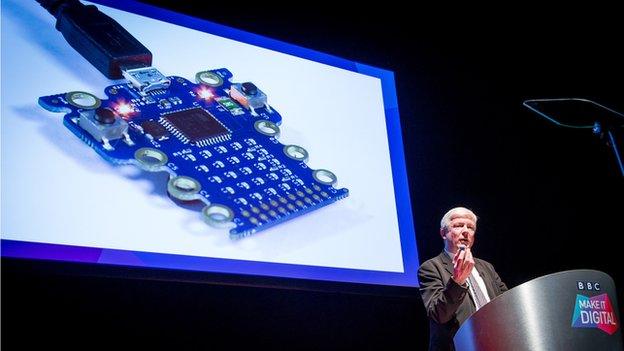The Micro Bit - can it make us digital?
- Published
- comments

The BBC plans to give a million children a tiny computer this September.
It is called the Micro Bit and it was unveiled at this morning's launch of Make It Digital, an ambitious project aimed at getting us all to be a bit more creative with digital technology.
On hearing about this, I had some questions which I expect occurred to many of you too. Such as what is it for, why is the BBC spending licence fee money on this, and why not just give children a Raspberry Pi?
What is it for?
The device is very basic, effectively just a chip with some LEDs on it. It has one micro-USB port and is powered by a watch battery.
By plugging it into a computer, children will be able to programme the LEDs to flash their name or a simple message.
The prototype I've been given flashes "I Love Coding". Nobody is claiming this will teach you coding - just that it is a fun way to introduce children to the idea that you can make things happen with a simple program.
But once they have done that they can potentially move on to more advanced projects - you can hook up sensors and a servo to drive a motor.
Why is the BBC doing it?
The device must be cheap to make - nobody will tell me how much - but nevertheless a million of them adds up to a substantial cost. However, the Micro Bit is being designed in collaboration with leading technology companies which are bearing most of the cost.
The whole idea of the Micro Bit and the wider Make It Digital scheme is that the BBC hooks up with partners in industry and education to help build the digital skills that the UK will need.
Why not a Raspberry Pi?
There is already a very successful mini-computer aimed at teaching children to code - the Raspberry Pi. A few years back, the people behind it came to see me and told me they would like it to become the BBC Micro for the digital era. But that would have been a more expensive undertaking and might have raised competition issues - and it never happened.
Now, the BBC has opted for something complements rather than replaces the Pi.
"It's really fun," said the Pi's creator Eben Upton when I got him on the phone this afternoon. "There's something about hardware that really fires kids' enthusiasm. He said his team was working to provide software resources for the Micro Bit.
One thing to bear in mind - the tiny computer is still a work-in-progress. There is still a lot to do before it is ready to go into the hands of a million school children in September. Then we will see just how creative they can be with a tiny computer.